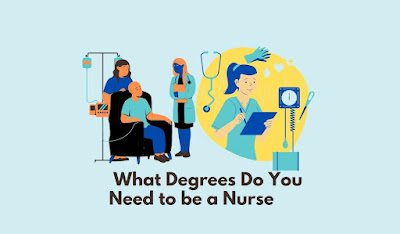What Degrees Do You Need to be a Nurse-Nursing is a rewarding and challenging career that requires a specific set of skills and knowledge. if you are interested in nursing education and want to know about "What Education is Needed to Become a Nurse" then you are at right post. you can read blog on "What Degrees Do You Need to be a Nurse".
- What Education is Needed to Become a Nurse:
If you're interested in becoming a nurse, you're likely wondering what education and degrees you'll need to pursue this rewarding career. In this blog post, we'll go over the various educational paths you can take to become a nurse, as well as the degrees that are required or recommended for different nursing roles.
To begin with, it's important to note that nursing is a regulated profession, which means that in order to practice as a nurse, you must be licensed by your state or territory's nursing board. In order to be eligible for licensure, you must complete an accredited nursing education program and pass the National Council Licensure Examination for Registered Nurses (NCLEX-RN).
There are several different educational paths you can take to become a nurse, each of which leads to a different type of nursing degree:
What Degrees Do You Need to be a Nurse:
- Associate Degree in Nursing (ADN):
An Associate Degree in Nursing (ADN) is a two-year program that is offered at community colleges and technical schools. ADN programs typically include coursework in anatomy, physiology, pharmacology, and nursing theory, as well as clinical experience in hospitals and other healthcare settings. Upon graduation, ADN-prepared nurses are eligible to take the NCLEX-RN and apply for licensure as a registered nurse (RN).
- Bachelor of Science in Nursing (BSN):
A Bachelor of Science in Nursing (BSN) is a four-year program that is typically offered at colleges and universities. BSN programs build upon the foundation of an ADN program, with additional coursework in leadership, management, and healthcare policy. BSN programs also usually include a greater emphasis on clinical experience, with students completing clinical rotations in a variety of healthcare settings. Upon graduation, BSN-prepared nurses are eligible to take the NCLEX-RN and apply for licensure as an RN.
- Accelerated Bachelor of Science in Nursing (ABSN):
An Accelerated Bachelor of Science in Nursing (ABSN) is a program that allows individuals who have already earned a non-nursing bachelor's degree to transition into nursing. ABSN programs typically take one to two years to complete and include coursework in nursing theory and clinical practice, as well as clinical rotations in healthcare settings. Upon graduation, ABSN-prepared nurses are eligible to take the NCLEX-RN and apply for licensure as an RN.
- Master of Science in Nursing (MSN):
A Master of Science in Nursing (MSN) is a graduate-level degree that is typically pursued by nurses who want to advance their careers and take on leadership roles within the nursing profession. MSN programs generally take two to three years to complete and include coursework in advanced nursing practice, healthcare policy, and leadership. MSN programs also usually include clinical experience in specialized areas of nursing practice, such as primary care, acute care, or nursing education. Upon graduation, MSN-prepared nurses are eligible to take advanced practice nursing certification exams, such as the Certified Nurse Practitioner (CNP) exam or the Certified Nurse-Midwife (CNM) exam.
- Doctor of Nursing Practice (DNP):
A Doctor of Nursing Practice (DNP) is a terminal degree in nursing that is designed for nurses who want to assume leadership roles within the nursing profession and contribute to the advancement of nursing practice and healthcare policy. DNP programs generally take three to four years to complete and include coursework in advanced nursing practice, healthcare policy, and leadership, as well as a capstone project in which students apply their knowledge and skills to a real-world nursing problem. Upon graduation, DNP-prepared.



.jpg)


0 Comments